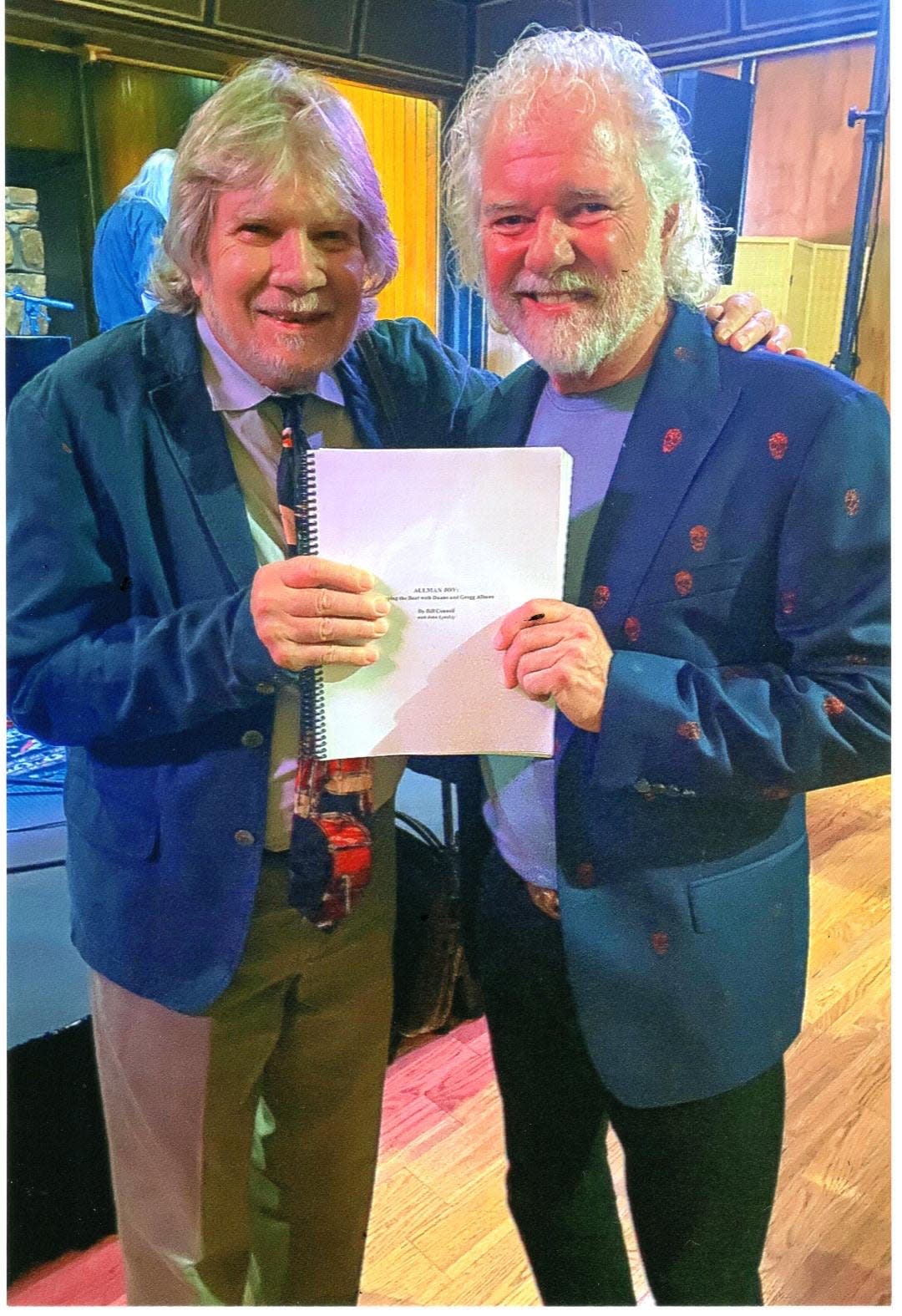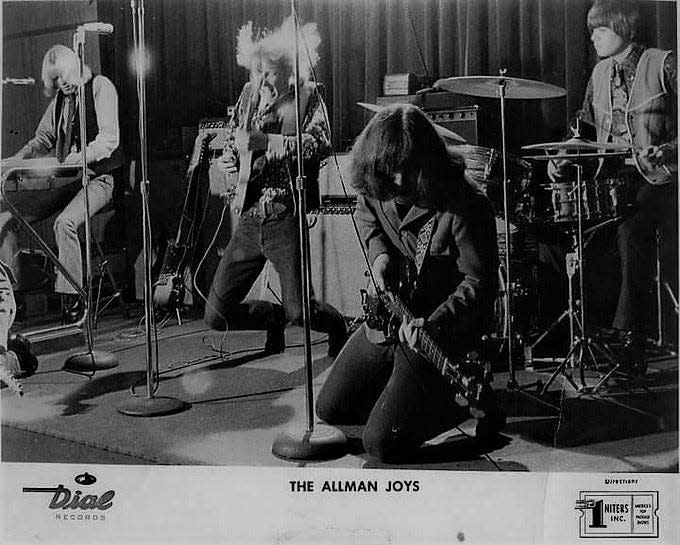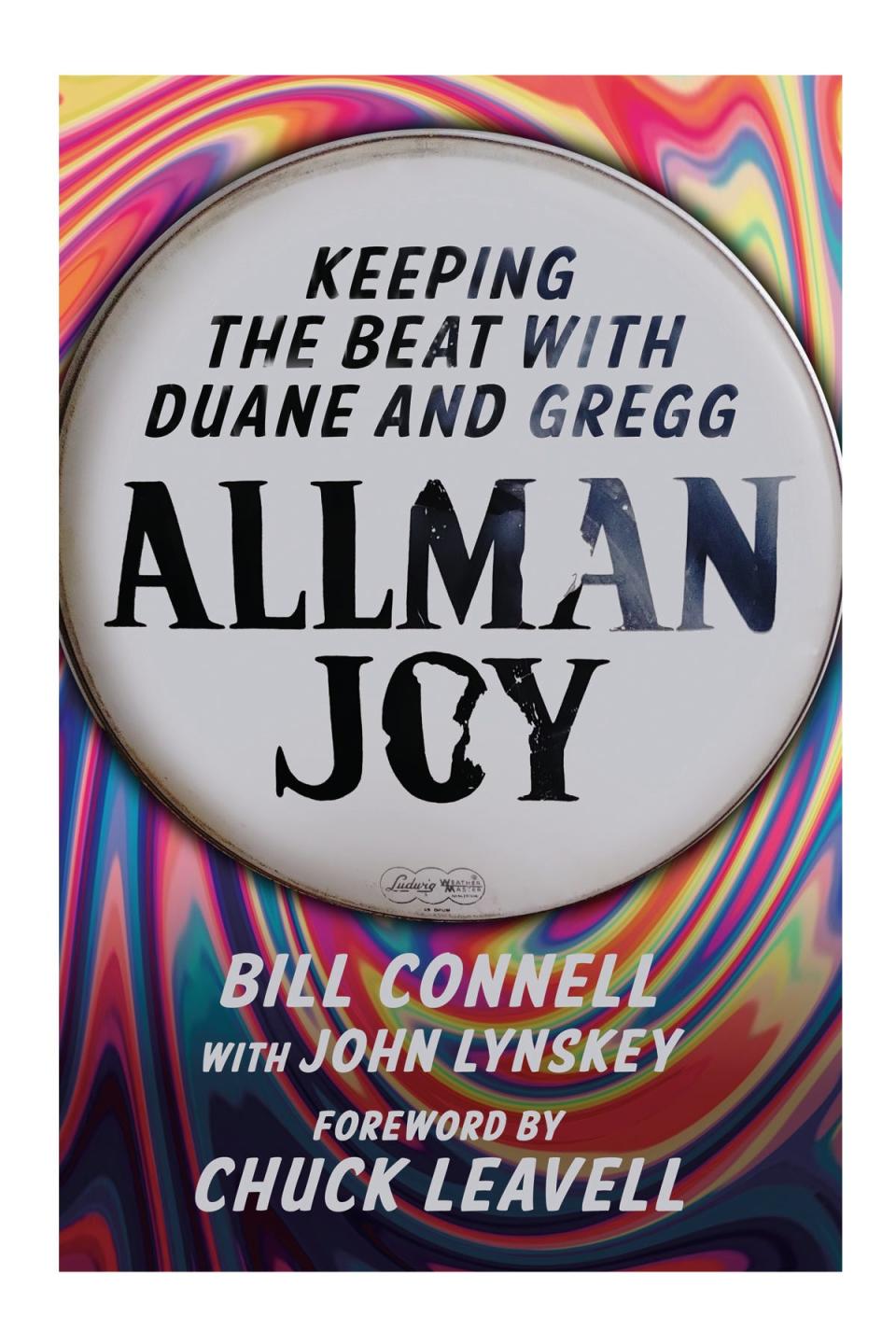Memoir by Tuscaloosa drummer reveals early days of Allman Brothers Band

- Oops!Something went wrong.Please try again later.
- Oops!Something went wrong.Please try again later.
- Oops!Something went wrong.Please try again later.
- Oops!Something went wrong.Please try again later.
Though many of the famous folks in the late Bill Connell's memoir "Allman Joy: Keeping the Beat with Duane and Gregg" have gone by the point of caring, their musical road goes on forever, said John Lynskey, who co-wrote the book.
Lynskey's chief task was capturing Connell's distinctive tale-telling voice, while editing and tightening the picturesque jumble of memories into a narrative. In talking with the drummer, and other Tuscaloosa music people and musicians such as Chuck Leavell, Paul Hornsby, Mark Harrelson and Fred Styles, Lynskey, who co-authored Gregg Allman's best-selling autobiography "My Cross to Bear," learned things he'd never heard before, despite association with the Allmans extending back to 1995.
More: Tuscaloosa native Bill Connell, drummer for Duane and Gregg Allman, dies at 74
"It's the most detailed account of the earliest years of the Allman brothers that you're ever going to read," Lynskey said. "It's a fun read, it's a revealing read, and it's a moment in time that now is officially closed."
Lynskey is referring to the deaths of Gregg and Duane Allman, who hired Connell right out of Tuscaloosa High School to play with the Allman Joys, and of other Allman Brothers Band family such as Berry Oakley and Butch Trucks, but also of Connell himself, who died unexpectedly at the age of 74 on March 31, though not before holding a copy of the manuscript edition of his book. It's published by Mercer University Press, is being shipped now, and should be in bookstores in early August.
Leavell, for decades keyboardist and musical director with the Rolling Stones, played a role in Connell's memoir. The Macon, Georgia, tree farmer, writer and musician paired Connell with Jeff Craig, with whom Leavell had co-authored two books. Though Leavell's turn with the Allman Brothers Band began in '73, years after Connell's Allman run, Tuscaloosa ties proved robust. In the '60s, the Druid City sprouted musicians the way University of Alabama football coach Paul W. "Bear" Bryant fielded champions.
![Bill Connell sits outside his apartment in Tuscaloosa Thursday Jan. 21, 2020. Connell is writing a memoir about his years in the music business. He played with Gregg and Duane Allman in one of their earlier bands called the Allman Joys. [Staff Photo/Gary Cosby Jr.]](https://s.yimg.com/ny/api/res/1.2/WfF9vVoMmIVQgwlw.MhvQw--/YXBwaWQ9aGlnaGxhbmRlcjt3PTk2MDtoPTYyMw--/https://media.zenfs.com/en/the-tuscaloosa-news/354119ce689663ecdc50d0dd0daf3c51)
"Living in Tuscaloosa, I saw the Allman Joys several times, with Bill playing drums," Leavell said in April, before Connell's funeral. "We were all very young musicians, in a community of young musicians," among them Johnny Townsend, Eddie Hinton, Court Pickett, Lou Mullenix and others who carried on in Muscle Shoals, Macon, Memphis and beyond.
Craig worked with Connell for months, until tragically dying from a fall in early 2022. Leavell reached out to Allman Brothers Band expert Lynskey, who picked up their notes, and talked with Connell and others several times a week for about 10 months. So five decades after Leavell played the sunlight-on-water piano solo that lifts hit instrumental "Jessica," from the '73 Allman Brothers Band "Brothers and Sisters" album, he helped bring Connell's less-told earlier tale forward.
"The Tuscaloosa music family, they have ties that bind for decades," Lynskey said.
Family ties that bind
After a decade that saw him grow from pre-teen drummer for a swing group to YMCA-dance-band musician to Allman Joy to Navy enlistee, Connell did continue to play. But in the late '70s, Connell returned to Tuscaloosa, earning a degree in broadcasting and film at the University of Alabama, then working as a producer and director for Alabama Public Television, including helping Doug Phillips create the award-winning "Discovering Alabama."
Back in 2005, he'd begun scribbling down his memories, wanting to leave his two sons complete stories not just of the Allman Joy days, but of gigs at Carnegie Hall and on "American Bandstand" with Alabama-born band Sailcat in 1972, and on into '70s work playing behind keyboardist-singer Bobby Whitlock, who had begun a solo career after years with Derek and the Dominos, Sam and Dave, Booker T. and the MGs, and Delaney and Bonnie and Friends.
Once he began setting things down, reminiscences triggered recollections.
"I'm amazed at myself that I was able to remember everything as vividly as I did. It hit me one day in 2005, so I started writing, and I couldn't stop. I still can't stop. I'm still writing. This has got to stop somewhere," he said, laughing, in a 2021 interview with The Tuscaloosa News.
He grew up in a family of music and musicians, and though piano lessons didn't take, his incessant pencil-tapping and hand-slapping led his grandmother and parents to buy him a snare, cymbal, and blue-and-silver-striped Ludwig bass drum. In 1961, at age 12, Connell joined a Dixieland swing group with some of his violin/bass-playing dad's former traveling orchestra bandmates. Earning the princely sum of $25 a night for gigs at the Elks Club, Moose Lodge or Tuscaloosa Country Club "flipped me out," he said.
After learning his chops, Connell drummed with bands including the Pacers, the 5 Men-Its, and the Nightcaps; with the latter group, in summer '65, playing weekend gigs at Dauphin Island's The Matinee. Not far away, the nascent Allman Joys were heating up Mobile's The Stork Club. As the only other long-haired white guys at an R&B show in Mobile, Connell and band met Duane, and wound up talking through the night. When not playing, they'd show up and support each other. Even then ― Duane 19, Gregg, 18 ― the Allmans shone, a cut above.

"Those two brothers loved music more than any other musician that I had ever met, and each were eager to talk about anything to do with it," Connell wrote in early drafts of his memoir. "Duane’s guitar work sounded as seasoned as a professional guitarist twice his age … astonishing and incredible for a nineteen-year-old." And the brothers clearly heard something in the 16-year-old Tuscaloosan, because next February, with the Allman Joys in for a gig at Tuscaloosa's Fort Brandon Armory, Connell was summoned to the Town House Motel.
Connell recalled the pitch like this, from Gregg: "Don’t ya want to get out of this little podunk small town and play with us alongside some of the best musicians out there? You ain’t gonna get extremely far in the music b’ness staying here. We’ve been thinking for a while that a 'yes' answer from you would make our group finally come together like we’ve wanted it to for a while. … Plus, you got teeth. All the girls out there are gonna love you."
Connell was hired to replace Maynard Portwood, cursed with a sweet tooth that left him, ironically, toothless, an image which didn't fit Duane's plans. And Duane always had plans, Lynksey said.
Duane's pitch to Connell: “You’ll have to leave your home here in Tuscaloosa and live with us on the road full time, but believe me, we’re gonna make it. You’ve got mine and Gregg’s word on that, Billy.”
In thse early drafts, Connell wrote: "I’m thinkin’ maybe Gregg and Duane see me as John Lennon saw Ringo Starr. John said ‘Pete Best is a good drummer, but Ringo is a good Beatle.’ They knew Maynard is a good drummer, but I would be a good Allman Joy."
Connell's folks wouldn't stand for him dropping out of school. Duane said "No problem. ... But, the night you graduate, a plane ticket will be waiting for you to come join us. As far as I’m concerned, you’re already in the band.”
They were as good as their word, so the morning after graduating from Tuscaloosa High School, class of 1966, decked out in formal Sunday best, Connell flew into Kennedy Airport.
Duane and a gaggle of friends awaited in bellbottoms and ballooning shirts, wide wild belts, jewelry and necklaces adorning, swaths of sideburns and hair waving. A hat was passed, and $250 helped get the kid into a flowing shirt, black bellbottoms and massive belt. They came up short on footwear, though, so he wound up playing Trude Heller's club in Greenwich Village that night in church shoes, with visions of Beatle boots dancing in his head, while watching Duane for signals to tempos, stops and starts.
"This Alabama redneck Methodist boy’s life changed that day," Connell wrote.
Between the lines
About much of this, Lynskey had previously only known broad outlines.
"I knew Bill was the second drummer for the Allman Joys, but had no idea how he got that gig," he said. From Connell, he learned more about the big brother-little brother dynamics, how even as teens Duane "Skydog" Allman was the leader, the driving force. While Gregg was a great singer, he'd always be the little brother.
He also gleaned details about Duane's first marriage; about touring on the "chitlin' circuit," venues that welcomed Black performers during times of musical segregation, but also accepted white bands that learned from the blues, and jazz; and a myriad of other things you won't read or hear anywhere else, he said. And Lynskey would know, having been editor-in-chief of the Allman Brothers Band's music magazine "Hittin' the Note," and serving as resident historian at The Allman Brothers Band Museum at The Big House in Macon, Georgia.
"I had no idea of their time in Greenwich Village at Trude Heller's, no idea that they met Jeff Beck and Jimmy Page," Lynskey said. "Their relationship with the Blue Magoos; the back stories to Eddie Hinton (another Tuscaloosa music prodigy, a guitarist, singer and songwriter), and Johnny Sandlin and Paul Hornsby ....
"These were all characters that weaved in and out of Duane and Gregg's musical careers, and Bill was kind of the common thread between all those things. It's a niche book, absolutely, but within that niche are some tremendous stories," he said.
In what recordings can be found of Connell with the Allman Joys, mostly raw live tracks, Lynskey said he was "Duane's type of drummer. He drove it. He was steady as a rock; everything Duane wanted in a drummer.
"I do think if he had not been drafted and gone into the Navy, chances are Bill would have ended up in the Allman Brothers Band. We'll never know, but that's how I feel after reading all this," Lynskey said.
On mustering out July 4, 1970, Connell traveled to Macon, Georgia, where the brothers had set up near their label, Capricorn Records, only to hear news: The Allman Joys, which had morphed into the Hour Glass, and from there grew into the Allman Brothers Band, already had its rhythm section well covered, with Butch Trucks and Jai Johanny "Jaimoe" Johanson.
"Duane told me 'Man, I'm so sorry, but we've already hired two drummers,' " Connell said, laughing, in that 2021 interview.
That lightheartedness, the sense of perspective on a life and career that could have been more, shines through in the book, Lynskey said.
"I love how his enthusiasm for life shows through," he said, "how much he treasured his time with those two guys."

Though they spoke often, the co-writers never actually met in person. Lynskey had planned to travel to Tuscaloosa, and Connell similarly wanted to come visit Macon, but they were thinking of timing to the book's release. Lynskey was crossing Ts, dotting Is, when he got the sad call, March 31. There's a photo in the book of Leavell and Connell, holding that rough early version of "Allman Joy." It was displayed at his funeral, April 12, in Tuscaloosa Memorial Chapel and Park.
"That meant a lot, that while he didn't see the final version, he knew it was complete," Lynskey said.
The family ripples seem never-ending, Lynskey said.
"There was the beauty of (Connell) and Gregg re-connecting, toward the end of Gregg's life," he said. Connell joined his former bandmate in 2015 for solo tours dates, a 50th anniversary celebration of working together.
"People sometimes lose sight of the fact that rock stars, celebrities, whatever, are human beings, too," Lynskey said. "Gregg was very generous to his old music friends. He never forgot them. In the last few years of his life, obviously with bringing Bill back into the fold, it's a beautiful story.
"And Chuck's loyalty. Why would a member of the Rolling Stones care about a guy he knew in Tuscaloosa 55 years ago? I could say the same about Mark Harrelson, Fred Styles, Paul Hornsby.
"Bill let me into his life. And although there will always be that regret, that he's not here to see it, I'm very proud that we, all together, made this book. It was meant to be."
"Allman Joy" is available for purchase through Alabama Book Store/bamastuff.com, amazon.com, barnesandnoble.com, or directly from the publisher, at www.mupress.org, or call toll-free 866-895-1472.
Reach Mark Hughes Cobb at mark.cobb@tuscaloosanews.com.
This article originally appeared on The Tuscaloosa News: Memoir offers insight into early days of Allman Brothers Band

